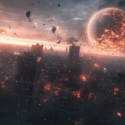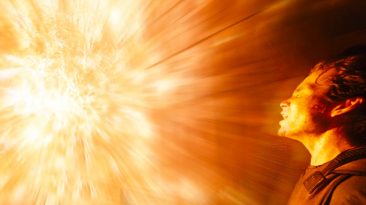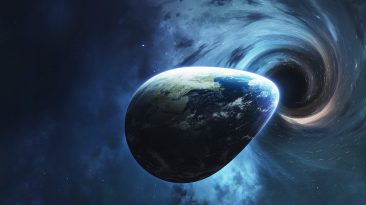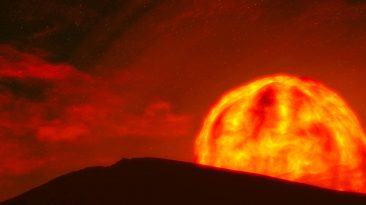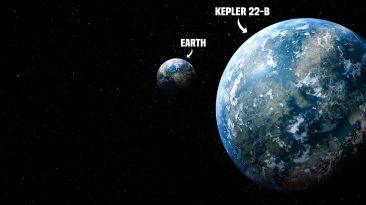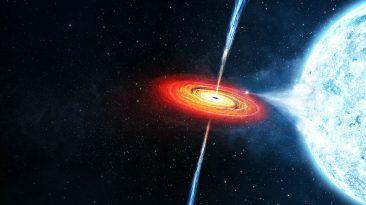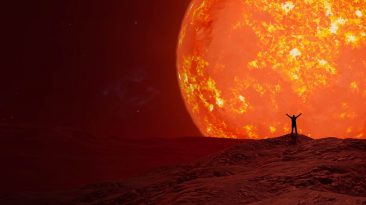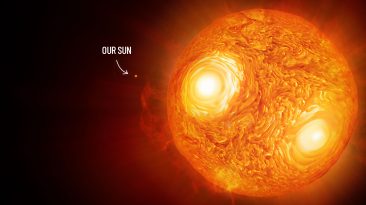Welcome to the void.Black holes remain the most mysterious and destructive force in our Universe. And when one explodes, the devastation permanently changes the structure of the Universe. But what if not one but all the black holes in the Universe suddenly exploded? Would you die instantly? Or would gravity suck you in? And how could you use this cosmic event to book yourself a journey in time?
In 2016, astronomers discovered the remnants of an explosion from a supermassive black hole almost 400 light-years from Earth. The event ripped through space and created a cosmic crater wide enough for 15 Milky Way galaxies to fit inside. This one blast ripped apart the Ophiuchus galaxy cluster and raged for over 100 million years. But what did it take to ignite its fuse?
A black hole, which is the remains of a dead star, contains a large concentration of matter squeezed into a tiny area. And its gravitational field becomes so strong that all matter, and even light, get sucked into its vortex. The Milky Way galaxy alone contains over 400 million black holes. In the center of our home galaxy, there’s a supermassive black hole over four million solar masses wide. And studies have found that most galaxies have these gravitational monsters at their core.
These supermassive black holes, like the one in our backyard, can expand to billions of times the size of the Sun. So is our galaxy a ticking time bomb? Now, speaking of black holes, 1% of these giants have a swirling mass of gas and dust called an accretion disk. The orbiting debris from this disk falls inside the black hole and shoots out at nearly the speed of light. Guided by twisted magnetic fields, the metals and radiation would burn brightly and return to the cosmos. Debris from the accretion disk endlessly feeds this giant singularity.
But what would it take for this behemoth to explode? The black hole would have to take in over 300 million solar masses of gas to create an explosion greater than the one that tore apart the Ophiuchus cluster. And the amount of gas it displaced would equal several trillion Suns. Across the Universe, the blast would rip galaxies apart and destroy planets. And depending on the amount of gas it took in, the explosion could continue for hundreds of millions of years. Unfortunately for planet Earth, we lay right in the path of a jet stream from Sagittarius A, the supermassive black hole in the Milky Way.
Superhot particles ejected from the black hole would slam into our planet along with lethal levels of radiation. Once the x-ray and gamma-ray photons reach Earth, they would destroy the ozone layer within months. With this protective layer gone, how long would it take for the radiation to fry the planet?
It would take over 1,000 years for those gamma rays to hit our planet if the closest black hole ,HR 6819, exploded. So while we might see several hundred new bright spots in the sky, it would take a millennium before our planet would feel its effects. I mean, if we’re still around. This cataclysmic event wouldn’t destroy the entire universe, just large parts of it. But the same materials left behind from the blast would create the seeds for new life. Over hundreds of billions of years, these particles could become new stars, galaxies or even life.
On Earth, time near the edge of the black hole would appear to last billions of years. And near the border of the singularity, an object would seem to hover there endlessly. But what would happen if Earth were sucked into a black hole?
Sources
- “Our Galaxy’s Supermassive Black Hole Could Be Pointing A Relativistic Jet Right At Us“.Starr, Michelle. 2021. Sciencealert.
- “Closest Black Hole To Earth Found ‘Hiding In Plain Sight‘”. 2021. Science.
- “This Black Hole Blew A Hole In The Cosmos (Published 2020)“. 2020. Nytimes.Com.
- “Supermassive Black Holes Drive The Evolution Of Galaxies“. 2021. Cosmotography.Com.
- “Black Holes | Science Mission Directorate”. 2021. Science.Nasa.Gov.





